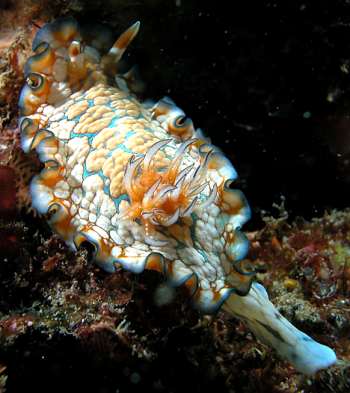
Glossodoris aeruginosa
Rudman, 1995
Order: NUDIBRANCHIA
Suborder: DORIDINA
Family: Chromodorididae
DISTRIBUTION
New Caledonia, tropical eastern Australia
PHOTO
off Noosa, Sunshine Coast, Queensland, Australia. Depth: 14m. Length: 70mm. Photo: Gary Cobb.
The colour of the mantle is quite complex but is dominated by a regular pattern of raised white patches which vary in size and aspect at different places on the mantle. Each white patch is edged with a narrow brown line. In the mid-region between the gills and the rhinophores, the background is a pale milky blue-green, the white patches are small and rounded and have a tinge of orange brown. The patches are aggregated into clusters leaving some quite large blue-green regions. Outside the central region, on the mantle skirt, the white patches do not have an orange tinge and they are aggregated in radially arranged elongate clusters. In these clusters the brown line around each patch is very faint but there is a dark brown line outlining the whole cluster. This gives the mantle skirt an appearance of large elongate white patches, each edged in brown arranged in radiating pattern. Towards the mantle edge the blue-green background colour is replaced with brown, which forms a broken submarginal band. At the edge of the mantle there is a diffuse bluish band which darkens right at the mantle edge.
The raised rhinophore pockets are translucent brown with scattered whitish patches. The rhinophore stalk is also translucent brown and the rhinophore club is translucent brown with a basal opaque white band. There is a white line down the posterior midline. The smaller gills are translucent orange-brown with large opaque white patches on the flattened outer face, and the larger gills are white. They are edged with a thin black or dark blue line. The gills are basically simple in forms but in larger gills the basal half of the gill is triangular in cross section, with a broad inner face. Some larger gills have one or two small branches.
The underside of the mantle is a translucent orange-brown with scattered white patches. The foot is also mottled white with a bluish-grey reticulate pattern. The mantle edge is slightly folded, and about midway down each side is a characteristic large semi-permanent fold. The rhinophore pockets are smooth but raised, and the rhinophore club is relatively elongate.
Reference:
• Marshall, J.G. & Willan, R.C. (1999) Nudibranchs of Heron Island, Great Barrier Reef.
• Rudman, W.B. (1995) The Chromodorididae (Opisthobranchia: Mollusca) of the Indo-West Pacific: further species from New Caledonia and the Noumea romeri colour group. Molluscan Research, 16: 1-43.
Rudman, W.B., 2004 (February 17) Glossodoris aeruginosa Rudman, 1995. [In] Sea Slug Forum. Australian Museum, Sydney. Available from http://www.seaslugforum.net/find/glosaeru
Related messages
Re: Glossodoris aeruginosa from sthn Queensland
December 30, 2006
From: Gary Cobb
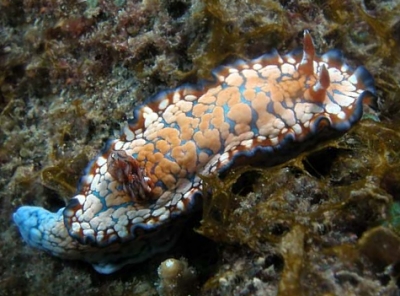
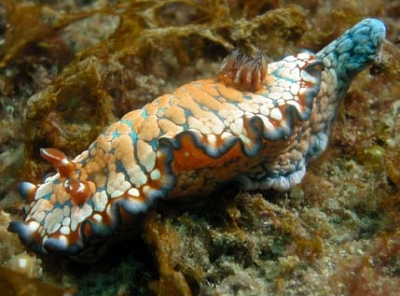
Concerning message #12237:
Hi Bill and everyone!
Well this weekend was very productive. We added 3 more species to our list and found another Glossodoris aeruginosa at Old Woman Island.
Locality: Old Woman Island, 6 m, Queensland, Pacific Ocean, 16 December 2006, Subtidal. Length: 68 mm. Photographer: Gary Cobb.
Cheers
Gary Cobb
gary@nudibranch.com.au
Cobb, G.C., 2006 (Dec 30) Re: Glossodoris aeruginosa from sthn Queensland. [Message in] Sea Slug Forum. Australian Museum, Sydney. Available from http://www.seaslugforum.net/find/19067
Dear Gary,
This is a nice Xmas present. It's good to get some more photos of this rarely reported species.
Best wishes,
Bill Rudman
Glossodoris aeruginosa from New Caledonia
December 23, 2004
From: Bill Rudman
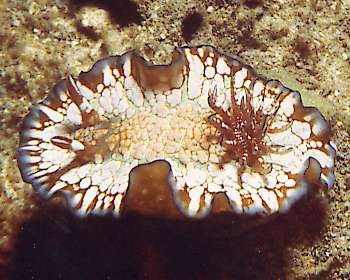
Since Glossodoris aeruginosa has rarely been reported, here is a photo of the holotype.
PHOTO: Banc Gail, S. Lagoon, between Noumea and Ile Ouen, New Caledonia, 30 m, 21 April 1988, AM C167978. Photo: P. Laboute
The name `aeruginosa' is Latin for being covered in verdigris, the green oxide found on tarnished copper or its alloys. This is a reference to the colour pattern of this species
Best wishes
Bill Rudman
Glossodoris aeruginosa from sthn Queensland
February 18, 2004
From: Gary Cobb

Hi Bill,
Please find another species I couldn't identify found off Noosa, sthn Queensland, Australia. This one appeared to me to be Glossodoris and is really beautiful with the tourquoise colour under the cream lumps. Richard Willan has identified it for me as Glossodoris aeruginosa. He said he had found it at Tangalooma and Heron Island.
Locality: off Noosa, north end of the Sunshine Coast, Queensland, Australia.
Depth: 14m, on small rocky outcrop
Divesite: 'Caves'
Water temp: 24C
Length: 70mm
How come this animal is not on the Forum? It has got to be one of the most beautiful Glossodoris I have seen!
Cheers,
Gary
gary@cobb.com.au
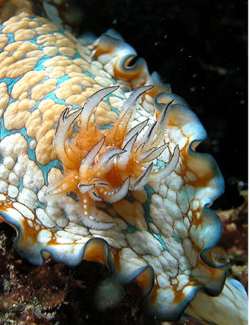
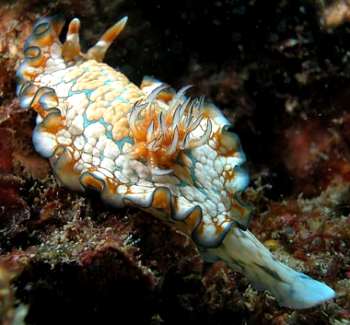
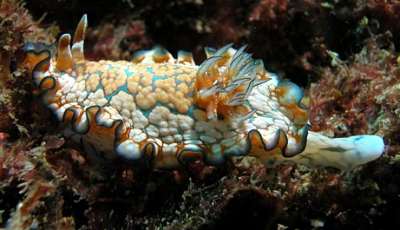
Dear Gary,
These are indeed beautiful photos of a beautiful species. Why isn't it on the Forum? Same reason as why many other species aren't there - too little time! The Fact Sheet has been half-finished since early 2003 so your message has been the catalyst for me completing it.
There are very few records of this species since the first from New Caledonia. We have a couple of new records from the Great Barrier Reef in the Museum's collections, and there are those in Marshall & Willan (1999).
Best wishes
Bill Rudman
